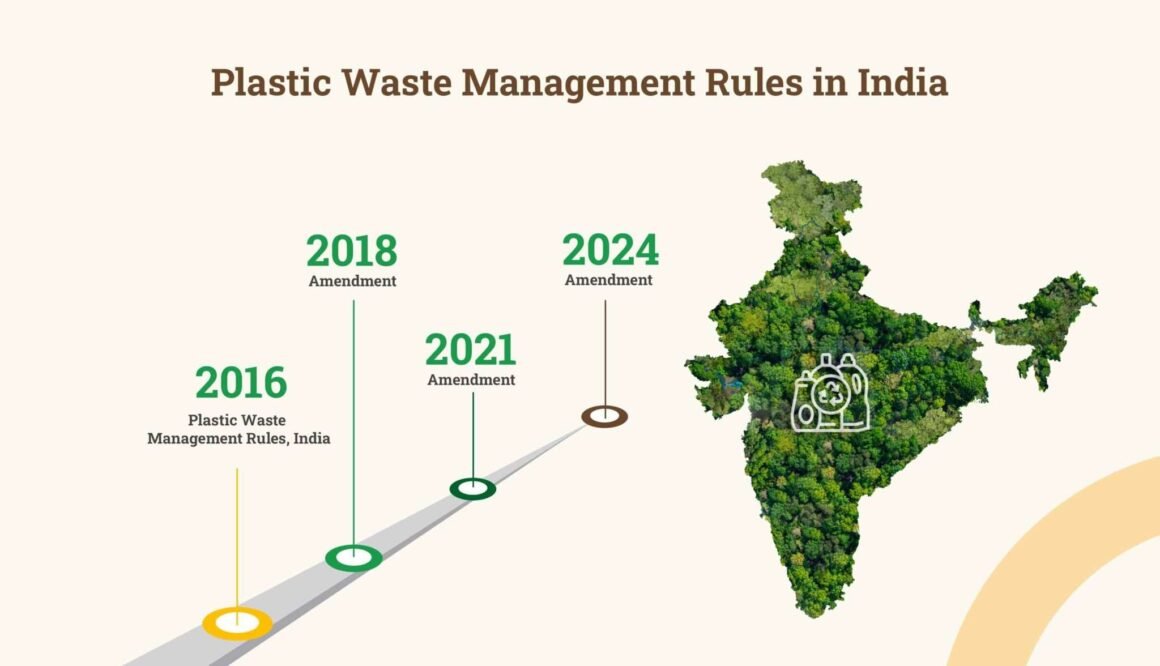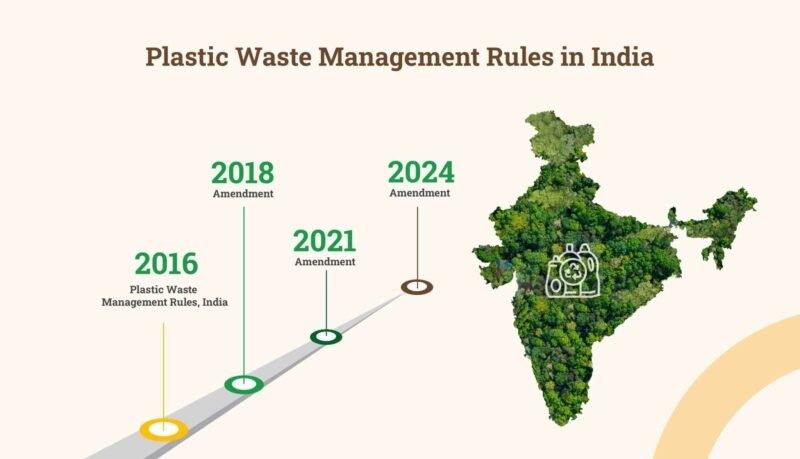From Pollution to Responsibility – How (PWM) Plastic Waste Management Rules 2022 Are Reshaping Corporate Accountability in India

India’s rapid economic growth has brought with it a massive increase in plastic consumption, resulting in rising environmental challenges. To address this issue, the Government of India introduced the Plastic Waste Management Rules in 2016, later strengthened through key amendments, most notably in 2022. These regulations aim to push India towards a cleaner, circular economy by promoting plastic recycling, reuse, and responsible disposal through Extended Producer Responsibility (EPR).
Evolution of (PWM) Plastic Waste Management Rules 2022
The Plastic Waste Management Rules 2016 replaced earlier regulations from 2011 to form a more comprehensive plastic governance framework. Over time, growing environmental threats led to further refinements through amendments in 2018, 2021, and 2022. The 2022 amendment is considered the most significant as it made EPR mandatory for plastic producers, importers, and brand owners.
Who Must Comply with Plastic Waste Management Rules?
The Plastic Waste Management Rules apply to businesses and institutions involved in handling plastic at any stage of its lifecycle. This includes:
- Producers of plastic packaging materials
- Importers of plastic products and packaging
- Brand owners who use plastic packaging (FMCG, retail, e-commerce, pharma)
- Manufacturers of plastic carry bags, flex packaging, sachets, multilayered plastics
- Plastic waste processors, recyclers, and co-processors
Plastic Categories Under Plastic Waste Management Rules 2022
The amendment classifies plastic packaging into four categories to streamline compliance:
- Category I: Rigid plastic (e.g., bottles, containers)
- Category II: Flexible plastic (wrappers, pouches)
- Category III: Multilayered plastic (composite packaging)
- Category IV: Compostable plastics
Objectives of the Plastic Waste Management Rules
- Eliminate littering and uncontrolled dumping of plastic waste
- Promote circular economy principles
- Increase recycling rates
- Minimise single-use plastic consumption
- Enforce producer accountability through EPR
Extended Producer Responsibility (EPR) Framework
The backbone of PWM Rules 2022 is EPR. It mandates that producers and brand owners take responsibility for managing the plastic waste generated from their products. Compliance includes:
- EPR registration on the CPCB portal
- Annual plastic footprint declaration
- Fulfilment of recycling targets (25% in 2022-23 up to 80%+ after 2025)
- Submission of EPR certificates from authorised recyclers
Compliance Filing and Documentation Requirements
Businesses must file annual returns by 30th June every year. Records must include:
- Quantity of plastic introduced into the market
- Waste collected and recycled
- Agreements with recyclers and disposal agencies
- EPR credits and certificates
Single-Use Plastic Prohibitions
PWM Rules strictly ban several single-use plastic (SUP) items such as:
- Plastic straws, cutlery, and plates
- Earbuds with plastic sticks
- Styrofoam decorations
Enforcement, Monitoring and Penalties
Non-compliance leads to Environmental Compensation (EC) penalties as per CPCB norms. CPCB and State Pollution Control Boards (SPCBs) conduct audits and inspections to ensure compliance.
Impact on Indian Industries
FMCG Sector
The fast-moving consumer goods sector is the single largest contributor to plastic packaging waste… [H3 expansion placeholder]
E-commerce and Retail
Major e-commerce platforms like Amazon and Flipkart…
Pharmaceutical Industry
Pharma relies heavily on high-quality packaging…
The rules impact major sectors such as FMCG, retail, pharma, and e-commerce. Companies are now adopting sustainable packaging alternatives, tying up with recyclers, and investing in reverse logistics systems.
Additional Compliance Requirements Under PWM Rules
To ensure the smooth implementation of the PWM Rules 2016 (Amended 2022), businesses must also focus on detailed compliance mechanisms:
Registration Requirements
All producers, importers, and brand owners (PIBOs) must register on the CPCB centralized portal. Operating without registration is strictly prohibited. Separate registrations are required for each state if the business operates regionally.
Recycling Targets Under EPR
The PWM Amendment 2022 mandates phased recycling targets for plastic waste based on the category and quantity of plastic introduced into the market:
- 2022–23: 25% reuse or recycling
- 2023–24: 60%
- 2024–25: 70%
- 2025–26 onwards: 80–100%
These targets compel companies to adopt sustainable plastic management strategies.
Role of Government Bodies
Different authorities play a role in enforcing the rules:
- MoEFCC – Frames national policies and issues amendments
- CPCB – Regulates EPR portal, auditing, and monitoring
- SPCB/PCC – Grants regional registration and conducts inspections
- ULBs – Manage local waste collection and disposal infrastructure
Extended Producer Responsibility Categories
Under EPR, plastic waste processors are classified into:
- Recyclers – Convert plastic into granules and reusable materials
- Waste-to-energy plants – Use non-recyclable plastic as fuel
- Co-processors – Dispose of plastic in cement kilns
- Plastic waste exporters – Export recyclable plastic waste (with permissions)
Challenges in Implementing (PWM) Plastic Waste Management Rules 2022
Despite strong regulations, challenges remain:
- Lack of awareness among small businesses
- Insufficient recycling infrastructure
- Overdependence on single-use plastic packaging
- Fake or questionable recycling certificates
- Informal waste sector remains unregulated
Solutions and Opportunities
- Adopting reusable packaging models in e-commerce
- Partnering with CPCB authorized recyclers
- Implementing digital waste traceability systems
- Integrating informal waste pickers into the recycling chain
- Investing in R&D for sustainable materials
Role of PROs (Producer Responsibility Organizations)
PROs help companies meet their EPR targets by:
- Collecting post-consumer plastic waste
- Managing reverse logistics
- Providing recycling certificates
- Submitting compliance reports
Future of Plastic Waste Management in India
India is moving toward a circular plastic economy. Upcoming trends include:
- Mandatory use of recycled plastic in packaging
- Expansion of biodegradable alternatives
- AI-based waste sorting technologies
- Blockchain for certificate validation
- Stricter audit mechanisms by CPCB
Conclusion
The Plastic Waste Management Rules 2016 (Amended 2022) mark a major shift in India’s sustainability journey by enforcing producer responsibility and structured plastic recovery systems. Businesses that align early with compliance not only avoid penalties but also improve ESG scores, gain consumer trust, and contribute to national sustainability goals. EPR under Plastic Waste Management is not just a legal mandate – it is a strategic opportunity to lead climate action and build future-ready brands.
If you need help with EPR registration, documentation, annual return filing, or recycler tie-ups, our consulting team can support end-to-end compliance.
Contact us today to ensure 100% (PWM) Plastic Waste Management Rules 2022 compliance.
FOR MORE BLOGS – beyondthepunchlines.com

 Add to favorites
Add to favorites







